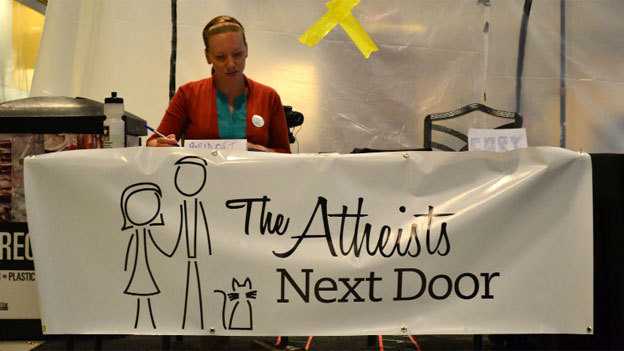Atheists and non-religious face growing oppression around world, says report

GENEVA – Atheists and secular humanists have faced growing oppression and discrimination around the world where their rights are not respected in most countries, a new report says.
Over the past year in some Islamic countries many have been murdered by extremists or sentenced to long jail terms just for expressing their views, according to Freedom of Thought Report 2015.
The report is released by the International Humanist and Ethical Union (IHEU).
The IHEU says it is the sole global umbrella organization embracing Humanist, atheist, rationalist, secularist, skeptic, laique, ethical cultural, freethought and similar organizations worldwide
'13 NATIONS PRESCRIBE DEATH FOR APOSTASY'
It notes that 13 countries - all in the Muslim world - prescribe the death penalty for apostasy, or leaving the official State religion, or for blasphemy, and subject unbelievers to other extreme punishments like flogging and long prison terms.
The United Nations top expert on religious affairs has criticized the onslaught against those who chose not to believe in a god.
Officially-secular Bangladesh has in 2015 seen five separate machete killings of atheist bloggers and publishers, in public and in broad daylight with police standing by.
In Saudi Arabia, a member of the UN's 48-nation Human Rights Council, a poet was sentenced to death for apostasy and a blogger to regular weekly lashings, as well as a long jail term, for "insulting Islam."
All this, says IHEU President Andrew Copson, while U.N. conventions on social and political rights to which these countries have subscribed declare that freedom of religion and belief are basic human rights.
Those conventions say that no-one should be persecuted or ill-treated for expressing their views or for abandoning one religion for another or abandoning any form of religious faith.
The study is issued annually on the UN's Human Rights Day, December 9.
"Last year, we recorded a rise in hate speech (against atheists and similar groups) and rhetoric: Presidents saying 'humanism and liberalism' were a threat to the State, laws branding atheism as 'terrorism,' and so on," said Copson.
"This year we've seen that rhetoric bubble over into truly malicious acts of persecution," he declared as the report was launched in Brussels in the presence of the U.N.'s special rapporteur on freedom of religion and belief Professor Heiner Bielefeldt who, although himself a theologian, attends IHEU gatherings.
The report notes that in territory controlled by the group that calls itself Islamic State in Iraq and Syria, ISIS, people suspected of atheism or of challenging in any way the precepts of Islam are executed out of hand, often in particularly gruesome ways.
But Copson said the "brutality" of ISIS against atheists – who count for some 14 percent of the world population according to independent surveys – seemed to be creating the space "for deep, noxious hatred against the non-religious in a growing number of countries, primarily Islamic states."
'EGYPTS DELCARES WAR ON ATHEISM'
Egypt, the report says, had publicly declared "war on atheism," while Malaysia has branded humanism, secularism and liberalism as threats to Islam, the state religion, and therefore to state security. Saudi Arabia defines "calling for atheist thought in any form" as the prime example of terrorism in the country.
Such behavior by governments, the IHEU says, encourages "fundamentalist vigilantes" – like in Bangladesh – to attack anyone who voices criticism of Islam or even just of some of its practices.
Such lynch law is further promoted by official indifference or even accusations from political leaders that the victims were at fault for "offending religion."
But the problems atheists and humanists face is not restricted to the Muslim world, the report makes clear.
It records that two rationalists - a term covering a wide range of non-religious thought in the country - had been assassinated over the past year, apparently by Hindu fundamentalists, after challenging religious superstition and right-wing policies.
In many African countries where different forms of Christianity predominate, the report indicated, people declaring atheism were often treated in the same fashion as gays and lesbians and subjected to harassment, public attacks in the media and from church pulpits, expulsion from jobs, barring from studies and even brutal assault and murder.
However, the IHEU says, some Western countries which proclaim their support for universal human rights are also involved in at best discrimination against atheists and humanists and at worst making it easy for them to be brought to court under blasphemy laws, on charges of "causing offence" or of engaging in "hate speech" simply for voicing their views on religious matters.
Britain, the report notes, has seen an increasing swing in its education system towards allowing religious organizations to take over state schools, where terms of admission force atheist and humanist parents to pretend to be religious and where children are subjected to classes in religion with little or no exposure to other philosophies of life.
In Canada, "despite what should be strong constitutional protections for freedom of thought and expression, significant religious privileges are in force, both nationally and in several of its ten provinces and three territories," it declares.
Although the United States' record is largely satisfactory, the report says, humanist and civil liberties groups frequently have to fight hard to defend the inherent secularism of the constitution against efforts, often backed by local state authorities or officials, to enforce particular religious beliefs in the public sphere.
Sentiment against anyone voicing views against religion or criticizing it "has fed into the social idea that to be really American is to be religious, especially Christian," it adds.
This in turn made it difficult for anyone seeking political office at any significant level to publicly espouse atheism or humanism, forcing non-religious people even in Congress to pretend to have faith in a deity.